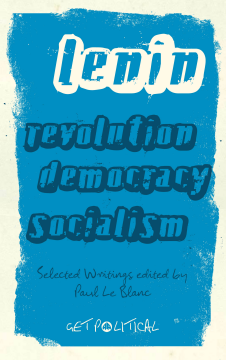
Additional Information
Book Details
Abstract
This is an entirely new collection of Lenin's writing. For the first time it brings together crucial shorter works, to show that Lenin held a life-long commitment to freedom and democracy. Le Blanc has written a comprehensive introduction, which gives an accessible overview of Lenin's life and work, and explains his relevance to political thought today.
Lenin has been much maligned in the mainstream, accused of viewing 'man as modeling clay' and of 'social engineering of the most radical kind.' However, in contrast to today's world leaders, who happily turn to violence to achieve their objectives, Lenin believed it impossible to reach his goals 'by any other path than that of political democracy.'
'A reminder that what is, need not be, and that what has, seemingly, failed, can be reconstituted anew'
Professor Bryan Palmer, Trent University, author of E. P. Thompson: Objections and Oppositions and James P. Cannon and the Origins of the American Revolutionary Left
Table of Contents
| Section Title | Page | Action | Price |
|---|---|---|---|
| Cover | Cover | ||
| CONTENTS | v | ||
| ACKNOWLEDGEMENTS | viii | ||
| Part One: Introductory Essay | 1 | ||
| 1. TEN REASONS FOR NOT READING LENIN | 3 | ||
| Lenin: A Succinct Biography | 6 | ||
| Lenin’s Critics | 21 | ||
| His Time and Ours | 41 | ||
| Further Reading | 66 | ||
| Notes | 73 | ||
| Part Two: Lenin’s Selected Writings, 1895–1923 | 81 | ||
| 2. MARXIST PROGRAMME AND REVOLUTIONARY ORGANISATION | 83 | ||
| 1895–96: Draft and Explanation of a Programme for the Social-Democratic Party | 85 | ||
| 1897–99: The Development of Capitalism in Russia | 94 | ||
| 1899: Our Programme | 113 | ||
| 1899: Our Immediate Task | 117 | ||
| 1899: Fuse Socialism With the Workers’ Movement | 122 | ||
| 3. BIRTH OF BOLSHEVISM | 128 | ||
| 1900: The Urgent Tasks of Our Movement | 131 | ||
| 1902: What Is To Be Done? | 136 | ||
| 1903: To the Rural Poor | 144 | ||
| 1904: One Step Forward, Two Steps Back – Reply to Rosa Luxemburg | 151 | ||
| 1904: Against Subordination to Liberals | 162 | ||
| 4. 1905: CHALLENGES OF THE REVOLUTIONARY UPSURGE | 167 | ||
| 1905: The Beginning of the Revolution in Russia | 170 | ||
| 1905: A Militant Agreement for the Uprising | 173 | ||
| 1905: Two Tactics of Social Democracy in the Democratic Revolution | 181 | ||
| 1905: Our Tasks and the Soviet of Workers’ Deputies | 187 | ||
| 1905: Socialism and Religion | 192 | ||
| 5. CREATION OF THE BOLSHEVIK PARTY | 197 | ||
| 1906: Freedom to Criticise and Unity of Action | 200 | ||
| 1909: Break with Ultra-Left Bolsheviks | 202 | ||
| 1912: Final Break with the Mensheviks | 203 | ||
| 1914: Report to Brussels | 205 | ||
| 6. IMPERIALIST WAR, NATIONAL LIBERATION, REVOLUTIONARY DEMOCRACY | 216 | ||
| 1913: The Historical Destiny of the Doctrine of Karl Marx | 219 | ||
| 1915: Socialism and War | 222 | ||
| 1915: The Revolutionary Proletariat and the Rights of Nations to Self-Determination | 232 | ||
| 1916: Imperialism, the Highest Stage of Capitalism | 236 | ||
| 1917: Statistics and Sociology | 249 | ||
| 7. 1917 REVOLUTION | 257 | ||
| 1917: Letters on Tactics | 259 | ||
| 1917: The State and Revolution | 262 | ||
| 1917: To the Population – Take Power in Your Own Hands | 278 | ||
| 1918: Dissolution of the Constituent Assembly | 280 | ||
| 8. WORLD REVOLUTION | 285 | ||
| 1918: Letter to American Workers | 287 | ||
| 1919: The Third International and Its Place in History | 301 | ||
| 1920: ‘Left-Wing’ Communism, An Infantile Disorder | 305 | ||
| 1921: Speech on Tactics of the Communist International | 315 | ||
| 9. REACHING FOR SOCIALISM,RESISTING BUREAUCRACY | 320 | ||
| 1919: Tasks of the Working Women’s Movement | 325 | ||
| 1919: Comments to Congress on Adult Education | 328 | ||
| 1920: On the Trade Unions | 335 | ||
| 1921: The Party Crisis | 336 | ||
| 1923: Better Fewer, But Better | 337 | ||
| INDEX | 353 |
